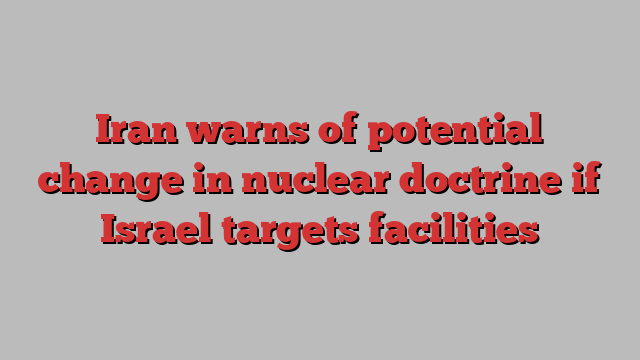
Unlock the Editor’s Digest for free
Roula Khalaf, Editor of the FT, selects her favourite stories in this weekly newsletter.
A senior adviser to Iran’s supreme leader has warned Tehran could change its nuclear doctrine if Israel targets the Islamic republic’s atomic facilities.
As Iran and the wider Middle East brace for Israeli Prime Minister Benjamin Netanyahu’s response to last week’s Iranian missile attack on Israel, Brigadier General Rasoul Sanaei-Rad said: “Striking nuclear sites could certainly have an impact on the calculations during and after the war.”
“Some politicians have already raised the possibility of changes in [Iran’s] nuclear strategic policies,” Sanaei-Rad, a political adviser to Ayatollah Ali Khamenei, told Fars, an Iranian news agency. “Moreover, such actions [an Israeli strike on Iran’s nuclear plants] would cross regional and global red lines.”
After Iran fired more than 180 ballistic missiles at Israel in retaliation for the assassination of Hizbollah leader Hassan Nasrallah and other militant leaders, prominent right-wing Israelis said Netanyahu’s government should target the republic’s nuclear programme. Israel has long viewed it as its most serious strategic threat.
But western diplomats have warned that would be the most extreme retaliation. The US has urged Netanyahu against targeting Iran’s nuclear sites or its oil infrastructure.
Experts say Israel was unlikely to be able to launch successful strikes on Iran’s nuclear facilities — its main plants are heavily defended and built deep underground — without US support.
But Israeli defence minister Yoav Gallant on Wednesday said Israel’s response would be “deadly, precise and above all surprising”.
“They will not understand what happened and how it happened,” he said. “They will see the results.”
Since Hamas’s October 7 attack last year on Israel triggered a wave of regional hostilities between Israeli forces and Iran-backed militants, officials in Tehran have warned the Islamic republic could change its nuclear doctrine if it faced an existential threat.
But they have been deliberately ambiguous about what that might entail.
Sanaei-Rad said: “Nuclear facilities have their own protocols that both parties must consider during wartime.”
“Any potential response from Iran would undoubtedly reflect on this and have an impact, just as attacks on oil and gas facilities could affect regional energy security and global energy prices,” he said, hinting that Iran could retaliate by targeting Israel’s nuclear facilities.
Israel — the only Middle East state with nuclear weapons, although it does not publicly acknowledge the fact — and western nations have long harboured concerns about Iran’s expanding programme.
Tehran has aggressively built up its nuclear activities since former US president Donald Trump in 2018 unilaterally withdrew from an accord Iran signed with world powers and imposed sanctions on the country.
It has installed advanced centrifuges and has been enriching uranium at 60 per cent purity, which is close to weapons grade, for more than three years.
The International Atomic Energy Agency, which has inspectors in Iran, estimates the country has sufficient fissile material to produce about three nuclear bombs within a matter of weeks, if it chose to do so.
But the UN nuclear watchdog and US officials say there is no evidence Iran is developing a weapon.
Iran insists its programme is for civilian purposes only, and its new president, Masoud Pezeshkian has said he wants to re-engage with the west to resolve the nuclear stand-off and secure sanctions relief to boost the economy.
But a hardline Iranian MP this week said 39 lawmakers had signed a letter addressed to the Supreme National Security Council, saying the country should strengthen its defence doctrine by including nuclear weapons.
An Iranian government spokesperson said there was no change in the nuclear doctrine, and cited a fatwa issued by Khamenei two decades ago prohibiting the development of nuclear weapons.